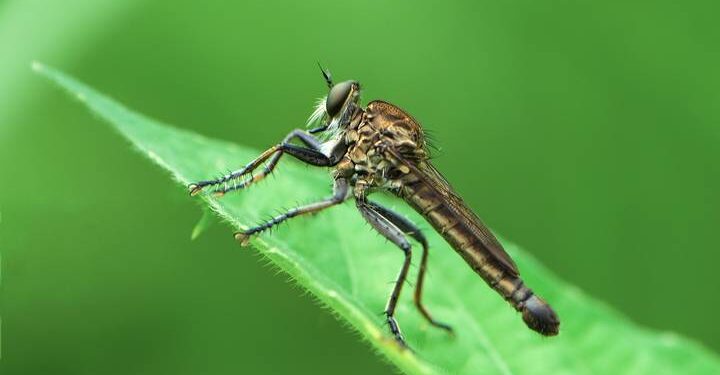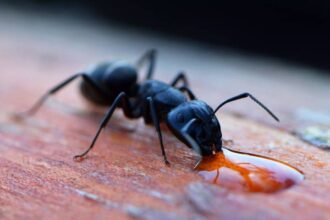What Flies Are Good For: Benefits of Flies

Flies are an unusual group of insects. Unlike most other insects with two pairs, they have just one pair of wings.
Fly species, like hoverflies, are essential for pollinating flowers, which helps countless plants reproduce. Flies also help break down decaying organic materials, such as dead animals and plants. This decomposition is crucial for returning nutrients to the ecosystem and assisting plants and other lifeforms.
Even though people sometimes see flies as pests due to diseases, it’s vital to understand their ecological worth. Flies support healthy ecosystems by assisting with pollination and nutrient recycling, proving their value extends beyond simple annoyances.
Let’s discover what flies are good for.
Flies are good for pollination
Though flies aren’t usually seen as key pollinators, they still contribute to pollination by seeking nectar from flowers. They may not be as efficient as bees or butterflies, but certain fly species accidentally spread pollen between flowers when feasting on nectar. This crucial pollen transfer enables plant fertilization, ultimately producing fruits and seeds.
There are many plants that attract flies. Flies tend to be lured towards flowers with intense odours and dark colours, mistaking them for decaying matter and a possible food source. By being drawn to these specific flowers, flies help move pollen from one bloom to another.
A prime example of fly pollination is their role in carrion flowers. These flowers emit a scent similar to rotting flesh, attracting flies searching for decaying matter. As flies visit these flowers, they unintentionally gather pollen and carry it to other carrion flowers, assisting in pollination.
Flies are good for decomposition
Flies also play a vital role in decomposition by breaking down organic matter like dead animals and waste. As nature’s recyclers, they decompose organic materials while keeping the environment clean. Blowflies, a fly from the Calliphoridae family, are often the first organisms to reach animal carcasses and start decomposition.
Decomposition carried out by flies has broad ecological benefits. It enriches soil with essential nutrients and compounds, boosting soil fertility and aiding plant growth. Although some people find flies bothersome or unattractive, their role in decomposition is crucial for maintaining environmental balance and healthy ecosystems.
Flies are good for soil aeration
Soil aeration is the method of letting air into the soil, making plants grow easier. It is needed for healthy soil and strong plant roots. When soil has enough air, plant roots can breathe and absorb critical nutrients. This also stops the soil from getting too packed together and hard, which can get in the way of root growth and water drainage.
When you aerate the soil well, plants grow better. If plants can easily reach nutrients and water in the soil, they will be much larger and stronger. For example, stirring up the soil in a garden can put more oxygen into it. This helps plant roots gather more nutrients from the soil to produce thicker, healthier plants. A good air supply for plant roots makes it easier for them to grow well, which is essential for farming and gardening.
Flies are good for food source
Flies rely on several different organic materials and substances as their food source. These insects are known for finding food almost anywhere. Many things like rotting materials, sweet nectar or even blood can be part of a fly’s diet.
Flies have a unique feature that allows them to eat many foods: their mouths have different shapes depending on the type of fly they are. Some flies have mouths made for sucking up or lapping at food, while others have chewing mouths instead. This skill lets flies eat all sorts of things, recycling natural nutrients.
Flies are good for medical research
Flies benefit medical research due to their brief lifespans and rapid reproduction. This makes them suitable for exploring genetics, illnesses, and various biological processes. Researchers can conduct experiments and collect data quickly thanks to these qualities.
For instance, scientists examining genetics can use flies to learn how specific genes function and their possible connections to particular diseases or characteristics. The fruit fly, Drosophila melanogaster, is often chosen for genetic research since its cellular structure is straightforward.
In addition, flies are affordable and simple to care for in lab settings. This convenience lets scientists execute a broad range of experiments effectively. For example, researchers can employ flies to examine the effects of diverse compounds on behaviour, lifespan or disease development.
Flies are good for pest control
Flies contribute to pest control as natural predators of numerous bothersome insects and pests. They consume other insects like larvae, mites and small arthropods that are typically considered pests. This natural predation ensures potentially harmful insect populations remain in check, fostering a more balanced ecosystem.
Flies can also indicate environmental health. Their presence or absence may hint at changes within an ecosystem, which can be crucial for monitoring an environment’s overall health. In this context, flies indirectly support pest control by helping researchers and environmentalists assess an ecosystem’s status.
Flies are good for nectar feeding
Flies help plants by feeding on nectar and pollinating. As they enjoy nectar, they accidentally move pollen between flowers, helping fertilize. This process is crucial for plant reproduction and helps flowers produce seeds for future generations.
Flies are especially helpful for hard-to-reach flowers, as their feeding activity often leads to contact with floral reproductive parts. Orchids, for example, rely on flies because their complex structures increase pollen and stigma.
Flies are good for waste recycling
In addition to supporting plant life, flies are also critical to recycling waste by breaking down organic matter. They help decompose dead plants and animals, leaves, and wood debris.
They lay eggs on decaying materials, and when maggots emerge, hungry larvae speed decomposition. This process returns nutrients to the soil for fresh plant growth while preventing organic waste buildup.
Flies are good for nutrient cycling
Flies also play a key role in nutrient cycling when they help turn organic matter into useful elements. They are among the first to break down plant and animal remains and other organic materials.
Their eggs hatch into maggots which consume and break down these substances. This decomposition releases essential nutrients like carbon, nitrogen, and phosphorus back into nature’s system.
Flies are good for parasite control
Lastly, flies help parasite control through their feeding habits. They feed on the blood or bodily fluids of vertebrate hosts, potentially reducing parasite populations that could infest these creatures. Some research even suggests that certain flies may act as natural predators to control parasite populations in some ecosystems.
Flies further contribute to parasite control by breaking down animal carcasses which would otherwise be breeding grounds for more parasites. This helps maintain wildlife health and reduces disease spread.


